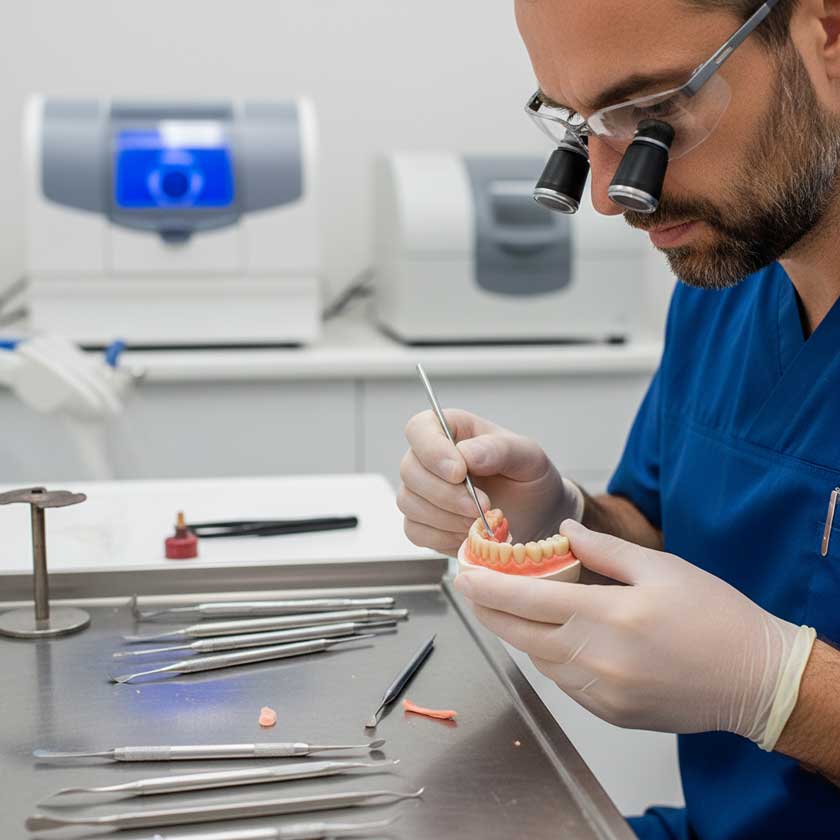Have you ever felt your dentures feel rough or look unattractive? It might be plaque buildup.
Plaque is a sticky film of bacteria that can form on dentures, just like on natural teeth. It can cause bad breath, gum disease, and cavities. Let's look at ways to keep your dentures clean and your smile shining.
Remember, taking care of your dentures every day is not a daunting task, but an essential one. This simple routine helps in controlling plaque and bacteria, giving you the power to maintain your oral health.
According to a study published in the Journal of Prosthodontics, daily denture cleaning can reduce the risk of oral infections by up to 70%. This research underscores the importance of regular denture maintenance.
There are many effective ways to remove plaque, such as using home remedies or cleaning professionally. Home solutions like baking soda, vinegar, and hydrogen peroxide are not just effective, but also readily available, giving you the confidence that you can maintain your dentures' cleanliness. Just remember to use them correctly to avoid potential harm to your dentures. And, of course, regular visits to the dentist for cleanings and check-ups are a must.
Key Takeaways
- Daily denture care is essential for managing plaque and bacteria
- Plaque can cause bad breath, gum disease, and cavities
- Dentures are easier to clean thoroughly than natural teeth
- Home solutions like baking soda, vinegar, and hydrogen peroxide are effective
- Professional denture cleaning is recommended for optimal care
- Avoid using very hot water or abrasive substances for cleaning
- Regular dental check-ups are essential for overall oral health
Understanding plaque on dentures.
Plaque is a soft, precise, or yellow film of bacteria. It forms on teeth, gums, and dentures. This film is the leading cause of many oral health problems. Let's explore how plaque affects dentures.
What is plaque, and why is it harmful?
Plaque is a bacterial coating that builds up on teeth and gums. A Journal of Clinical Periodontology study found that plaque can begin forming on clean surfaces within 4-12 hours. This rapid formation highlights the need for frequent cleaning.
When plaque makes acids, it eats away at tooth enamel, damaging the dentin layer and causing cavities. It can also lead to tartar, gingivitis, and bad breath.

How plaque affects dentures and oral health.
Plaque on dentures can cause gum inflammation and other oral health issues. Denture stomatitis, a condition with inflamed gums, is often caused by plaque. Research published in the International Journal of Dentistry indicates that up to 70% of denture wearers may experience denture stomatitis at some point, emphasizing the importance of proper denture hygiene.
Dentists suggest cleaning dentures every day to remove plaque and bacteria. Using an antiseptic mouthwash twice a day also helps fight harmful germs.
Signs of plaque buildup on dentures
It's essential to know the signs of plaque on dentures. Look for:
- Visible discoloration
- A fuzzy or rough texture
- Persistent bad odor
If you can't get plaque off your dentures, see a dentist for help. They can use special tools to clean them. While you can't stop plaque, controlling it can prevent tartar and keep your mouth healthy.
How to remove plaque from dentures?
It's important to clean dentures to keep your mouth healthy and comfy. Plaque forms when bacteria and food particles accumulate on dentures and teeth, creating a biofilm that can harbor harmful microorganisms.
The American Dental Association (ADA) recommends daily cleaning of dentures to maintain oral health and prevent infections. Let's explore evidence-based methods for plaque removal:

Baking soda solution method.
Mix two teaspoons of baking soda with warm water for a great denture cleaner. Soak your dentures in this mix overnight. In the morning, brush them with a soft toothbrush. A study in the Journal of Clinical Dentistry found that baking soda effectively reduces plaque and kills bacteria due to its alkaline nature.
Vinegar soak technique.
If your dentures don't have metal parts, try soaking them in vinegar. Use apple cider or white vinegar for a night. After washing, brush gently and rinse well. Research in the Journal of Prosthodontics showed that a 3.8% acetic acid solution (similar to household vinegar) effectively reduced Candida albicans, a common cause of denture stomatitis.
However, it's important to note that prolonged use of vinegar may affect the surface of acrylic dentures. Limit this method to once a week, and always consult your dentist if you need clarification.
Using hydrogen peroxide for plaque removal.
Hydrogen peroxide is excellent for cleaning dentures. Soak your dentures in it for a few hours or all night. A Journal of Contemporary Dental Practice study demonstrated that 3% hydrogen peroxide effectively reduces denture microbial load.
After soaking, brush and rinse well before wearing them again. While hydrogen peroxide is effective, it's crucial to rinse thoroughly as residual peroxide may irritate oral tissues.
Professional denture cleaning.
Home cleaning is vital, but seeing a dentist is also crucial. Dentists use special tools, like ultrasonic cleaners, to deep clean teeth. These visits also ensure that dentures fit right. The ADA recommends professional cleaning at least once a year to maintain optimal denture health and fit.
It's worth noting that some dental offices offer sedation dentistry for patients with dental anxiety, making professional cleaning more accessible for all denture wearers.
Clean your dentures daily with special products bearing the ADA Seal of Acceptance. To avoid damage, don't use hot water, harsh cleaners, or whitening toothpaste on them.
Conclusion
Keeping your dentures clean is essential for a healthy smile and fresh breath. Regular cleaning helps prevent gum problems and infections.
Use a soft toothbrush, denture cleaner, and warm water to remove plaque quickly. Soaking dentures in water and white vinegar can dissolve tartar. A paste made of baking soda and hydrogen peroxide also works well.
Home remedies like vinegar and baking soda are helpful, but be careful. They might harm your dentures or bother your gums. For hard tartar, see a dentist for a safe and effective cleaning.
Keeping dentures clean is vital for your health and happiness. Stick to a cleaning routine and visit your dentist often. This way, your dentures will stay in great shape, and your smile will shine.
Remember, while this article provides general guidance, it's always best to consult your dentist or denturist for personalized advice tailored to your dental health needs.
FAQ
What is plaque, and why is it harmful?
Plaque is a sticky film that covers dentures and teeth. It's made of saliva, bacteria, and food acids. If it builds up, it can lead to gum disease, infections, and even systemic health issues like heart disease and diabetes.
How does plaque affect dentures and oral health?
Plaque dentures can inflame the gums, cause bad breath, and lead to cavities in natural teeth. It can also contribute to denture stomatitis, a condition affecting up to 70% of denture wearers.
What are the signs of plaque buildup on dentures?
Look for discoloration, a fuzzy feel, and a bad smell. These are signs of plaque. If you notice these symptoms, it is crucial to clean your dentures thoroughly and consult your dentist if the issue persists.
How can I use a baking soda solution to remove plaque from dentures?
Mix two teaspoons of baking soda with one cup of warm water. Soak your dentures in it overnight. Then, brush them well in the morning. This method is effective due to baking soda's alkaline properties, which help neutralize acids and kill bacteria.
Can I soak dentures in vinegar to remove plaque?
If your dentures don't have metal parts, soak them in apple cider or white vinegar. Then, clean them with a toothbrush and rinse well. However, limit this to once a week to prevent potential damage to acrylic dentures.
How can hydrogen peroxide help remove plaque from dentures?
Use hydrogen peroxide to soak dentures for a few hours or overnight. It breaks down plaque. Brush and rinse them before wearing them again. A 3% solution has been shown to effectively reduce microbial load on dentures.
Why is professional denture cleaning important?
Regular visits to the dentist are essential for a check-up and professional cleaning. They use special tools, like ultrasonic cleaners, for a deep clean. Professional cleaning can reach areas that home cleaning might miss and helps maintain proper denture fit.








